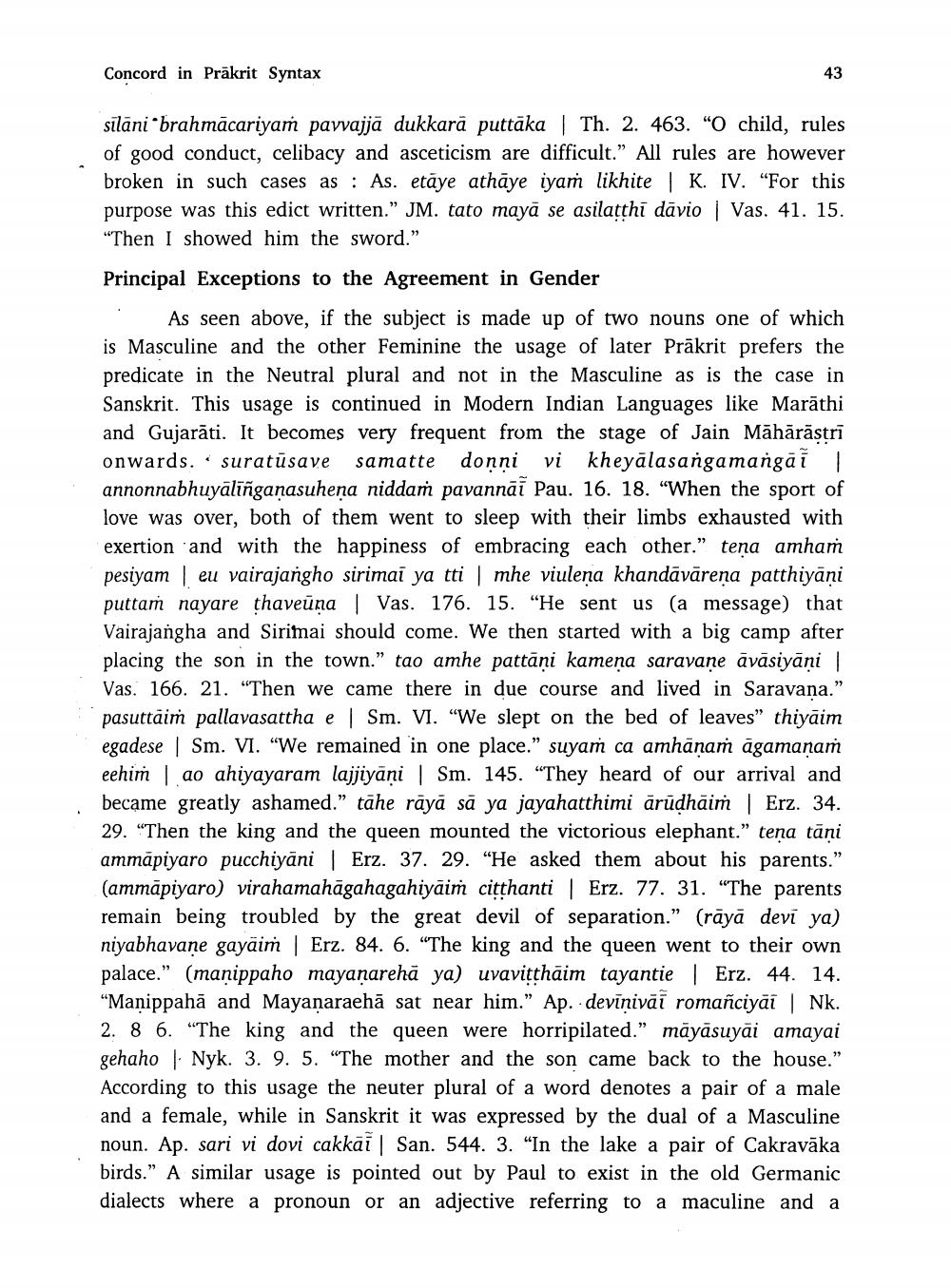________________
Concord in Prākrit Syntax
43
sīlāni brahmācariyam pavvajjā dukkarā puttāka Th. 2. 463. "O child, rules of good conduct, celibacy and asceticism are difficult.” All rules are however broken in such cases as : As. etāye athāye iyam likhite K. IV. “For this purpose was this edict written." JM. tato mayā se asilatthi dāvio | Vas. 41. 15. "Then I showed him the sword.”
Principal Exceptions to the Agreement in Gender
As seen above, if the subject is made up of two nouns one of which is Masculine and the other Feminine the usage of later Prākrit prefers the predicate in the Neutral plural and not in the Masculine as is the case in Sanskrit. This usage is continued in Modern Indian Languages like Marāthi and Gujarāti. It becomes very frequent from the stage of Jain Māhārāstri onwards. · suratūsave samatte donni vi kheyālasangamangāi I annonnabhuyālīñgaņasuhena niddam pavannāi Pau. 16. 18. “When the sport of love was over, both of them went to sleep with their limbs exhausted with exertion and with the happiness of embracing each other." tena amham pesiyam eu vairajangho sirimai ya tti | mhe viulena khandāvārena patthiyāni puttam nayare thaveūna Vas. 176. 15. “He sent us (a message) that Vairajangha and Sirimai should come. We then started with a big camp after placing the son in the town." tao amhe pattāṇi kamena saravane āvāsiyāni | Vas. 166. 21. "Then we came there in due course and lived in Saravana." pasuttaim pallavasattha e | Sm. VI. "We slept on the bed of leaves" thiyāim egadese | Sm. VI. "We remained in one place.” suyam ca amhānam āgamanań eehim | ao ahiyayaram lajjiyāņi | Sm. 145. “They heard of our arrival and became greatly ashamed." tāhe rāyā sa ya jayahatthimi ārūdhāim | Erz. 34. 29. "Then the king and the queen mounted the victorious elephant.” tena tāni ammāpiyaro pucchiyāni | Erz. 37. 29. "He asked them about his parents." (ammāpiyaro) virahamahāgahagahiyaim citthanti | Erz. 77. 31. "The parents remain being troubled by the great devil of separation." (rāyā devi ya) niyabhavane gayāim | Erz. 84. 6. “The king and the queen went to their own palace." (manippaho mayanarehã ya) uvavitthāim tayantie | Erz. 44. 14. "Manippahā and Mayanaraehā sat near him." Ap.devīnivãi romanciyai | Nk. 2.8 6. "The king and the queen were horripilated." māyāsuyäi amayai gehaho Nyk. 3. 9. 5. "The mother and the son came back to the house." According to this usage the neuter plural of a word denotes a pair of a male and a female, while in Sanskrit it was expressed by the dual of a Masculine noun. Ap. sari vi dovi cakkai San. 544. 3. "In the lake a pair of Cakravāka birds." A similar usage is pointed out by Paul to exist in the old Germanic dialects where a pronoun or an adjective referring to a maculine and a




